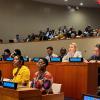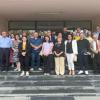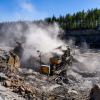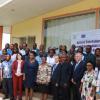News
Displaying Results 1 - 25 of 157
South Sudan, the world’s newest nation and a landlocked country in Eastern Central Africa, is situated in the middle of the basin of the Nile River, Africa’s longest river. Sharing significant transboundary wetlands, experiencing annual catastrophic floods and droughts and facing immense…
Civil society plays a vital role in addressing major environmental challenges. To fully harness this potential, ongoing efforts are essential to uphold the public rights to promote effective and inclusive environmental governance and a clean, healthy and sustainable environment.
To tackle these…
Taking part in the High-Level Political Forum on Sustainable Development in New York (8 – 17 July), UNECE Executive Secretary Tatiana Molcean presented UNECE regional perspectives on SDGs localization, climate action, energy, transport, water and engaged with civil society, youth, and the private…
As Europe advances towards a green and digital economy, the demand for Critical Raw Materials (CRMs) - such as lithium, nickel, rare earth elements and cobalt - is surging. The European Critical Raw Materials Act (CRMA) aims to secure stable and resilient CRM supply chains by setting benchmarks…
Mapping air pollutant emission sources in a country helps experts and decision-makers identify the most effective policies. Understanding the regional distribution of emissions is crucial for effective policy implementation.
Spatially allocating—or gridding—emissions is technically challenging.…
Zimbabwe, a landlocked country in Southern Africa, lies entirely within a total of five transboundary river basins (Buzi, Limpopo, Pungwe, Save and Zambezi) and one international lake (Kariba) while the number of transboundary aquifers is yet to be ascertained. These transboundary basins create…
Representatives from countries across Central Asia and experts on the climate and clean air came together in Astana, Kazakhstan this week (11-13 June 2024) for the Sub-Regional Workshop on Integrated Planning for Climate and Air organized by the UNEP-convened Climate and Clean Air Coalition (CCAC)…
Mediterranean countries come together to increase climate resilience of water and sanitation sectors
The Mediterranean region is warming 20% faster than the global average and for every 1-degree global temperature increase, it would warm up by at least 1.5-2 degrees. This is severely impacting water and sanitation and the health and well-being of the region’s population. According to the World…
In an important move to secure the supply of essential raw materials, the European Critical Raw Materials Act (CRMA) entered into force on 23 May 2024. This legislation is a cornerstone in enhancing the EU's capabilities in sourcing, processing, and recycling critical raw materials (CRMs), which…
In North Macedonia, assisting households to make investments in green technologies not only supports climate action, but also helps them save on energy costs and improves living standards.
To support this aim, UNECE, UNDP, and IOM organized a Capacity Building Workshop in Skopje on the design of…
With its strong mining industry, mountainous areas and high seismic hazards, prevention and preparedness for disasters and climate change adaptation are high on Tajikistan’s agenda. In particular, the increasing frequency and severity of weather events due to climate change can undermine the safety…
The Fourth Cycle of UNECE Environmental Performance Reviews (EPR) is underway with the fourth review of Montenegro, carried out under the leadership of UNECE.
A large, multidisciplinary team of international experts worked in Podgorica from 22 to 30 April 2024, assessing the environmental…
As the climate warms, wildfires are becoming more frequent. Parts of Southern Europe, such as Spain and Greece, have already seen their first wildfires of the season, with devastating impacts on local ecosystems and biodiversity. Wildfires, however, also have major impacts on global and regional…
UNECE Resource Management Week 2024 spotlighted the growing roles of the United Nations Framework Classification for Resources (UNFC) and the United Nations Resource Management System (UNRMS) in promoting sustainable development through enhanced integration and effective management of natural…
As we move beyond the midpoint of the 2030 Agenda and with only 12% of the Sustainable Development Goals (SDGs) on track, an immediate, globally coordinated push to meet the 2030 deadline is urgently needed. Sustainable Public-Private Partnerships (PPPs) and infrastructure finance are central in…
Iraq grapples with severe water challenges exacerbated by climate change, population growth, upstream dam construction, and decades of conflict and instability. The Euphrates and Tigris rivers, vital lifelines for the region’s agriculture, ecosystems, and communities, face increasing threats from…
Much of Chad's water resources are shared, notably the Lake Chad basin and its many tributaries and distributaries (shared with Cameroon, Central African Republic, Libya, Niger, Nigeria, Sudan and Algeria), the Niger River basin (shared with Benin, Burkina Faso, Cameroon, Côte d'Ivoire, Guinea,…
Around 3.6 billion people live in contexts that are highly vulnerable to climate change and many of them are in transboundary basins. Droughts do not recognize borders, pose transboundary risks, and require cooperation to address them. The 6th IPCC assessment (2022) and the IPCC synthesis (2023)…
The raw materials sector is at the forefront of global challenges and opportunities of the 21st century, as it plays a vital role in the energy, transport, and digital transitions required to mitigate and adapt to climate change. However, the sector also faces significant pressures from consumers,…
Sierra Leone shares four major rivers with the neighbouring countries of Guinea and Liberia, including the Great Scarcies, Little Scarcies and Moa shared with Guinea, and Mano River shared with Liberia. All provide crucial freshwater that sustains ecosystems, livelihoods and the well-being of…
At the World Economic Forum Annual Meeting in Davos, UNECE Executive Secretary Tatiana Molcean highlighted the role of UNECE’s legal instruments, standards and tools in dealing with the most pressing global challenges, namely climate change, digital and green transformations, low-carbon energy…
Burkina Faso is one of the Sahelian countries hardest hit by the effects of climate change, experiencing torrential rains and floods, as well as periods of insufficient rainfall.
To help address these challenges, through adaptation, resilience and concerted, shared management of its water…
Originally introduced in policy and development discussions in 2011, the water-food-energy-ecosystem nexus approach has evolved into a pivotal framework for sustainable development and achieving the Sustainable Development Goals (SDGs).
Work on the water-energy-food-ecosystems nexus under the…
According to a recently published UNECE Policy Paper, the agrifood, the garment and footwear and the mineral sectors contribute significantly to the economic growth and employment in the UNECE region, while being major sources of global greenhouse gases (GHG) and environmental pollution. Evidence…
Transparency in the environmental performance of economic activities and effective public access to environmental information, especially on products, are indispensable in addressing pressing environmental challenges. This also supports a just transition towards a green and circular economy,…


























